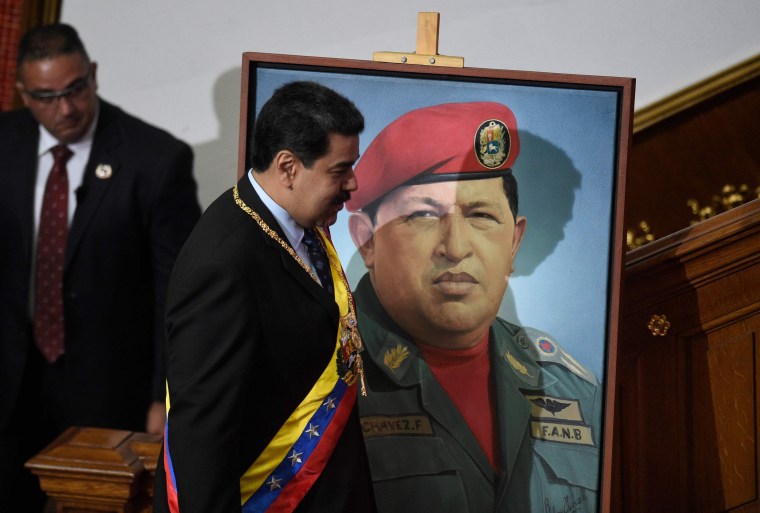WASHINGTON — President Donald Trump's quick embrace of Venezuelan opposition leader Juan Guaidó on Wednesday was a notable departure from his "America First" aversion to foreign entanglements. But diplomats in the region say Trump has long argued for regime change in Venezuela, fueled by fierce opposition to the socialist Nicolás Maduro and his disastrous economic policies, as well as the Maduro regime's connections to Cuba.
The U.S. did not intervene with a light touch: As the anti-regime protests were gaining steam Tuesday, Vice President Mike Pence tweeted a video with Spanish subtitles — and spoke a few phrases in Spanish — denouncing Maduro as a dictator and urging people to rise up against him.
There has been no U.S. ambassador in Caracas since 2010, when the top American diplomat was expelled by Maduro's predecessor, the socialist firebrand Hugo Chávez. The current assistant secretary for the region, Kimberly Breier, has been in her position only since October. And so executing the decisions fell to Pence, national security adviser John Bolton and his staff, and Secretary of State Mike Pompeo.
Bolton has been widely criticized by foreign policy veterans for not convening any inter-agency "principals meetings" to thrash through policies. He has no deputy to lead the inter-agency Deputies Committee that has been the operational arm of past National Security Councils.
Given that vacuum, for months the president's Venezuela policy has practically been subcontracted to Sen. Marco Rubio, R-Fla., the administration's point person for getting rid of Maduro. And all this is happening with a State Department decimated by vacancies, demoralized by an unprecedented politicization of the nonpartisan foreign service, and for the last month, crippled by the government shutdown.
The State Department, unlike the military and many other national security agencies, was not exempt from the furlough. According to a State Department spokesman, approximately 23 percent of the department's overseas employees and 40 percent in the U.S. were furloughed.
Realizing how profound the impact was, the department's leaders last week called diplomats back to work, and belatedly promised two weeks of pay until appropriations are restored. The employees are still restricted from going to public meetings or even having a meal with their diplomatic counterparts working for other countries. That apparently includes the embassy personnel in the middle of the crisis in Caracas.
A senior administration official was asked today why the administration opposed Maduro, but not dictators in Russia, Turkey, Saudi Arabia or the Philippines. He answered that 33 of the 34 countries in the Western Hemisphere had signed a declaration committing themselves to democracy on Sept. 11, 2001, in Lima, Peru. (Then-Secretary of State Colin Powell signed for the U.S.)
Critics, including Rep. Ro Khanna, D-Calif., say that declaration does not excuse the president's alliance with other totalitarian regimes around the world. But in this instance, the Trump administration is in good company: Juan Guaidó's attempted takeover has also been endorsed by the Organization of American States and, individually, by Canada and most of the leading countries in South America.
Analysts say that the international community had little choice but to recognize Guaidó as the interim leader after Maduro lost legitimacy by trying to rig the elections and stamp out civil liberties. Now, the National Assembly has approved a plan to grant blanket amnesty to military and government officials who rose in opposition to Maduro.
The critical question is whether the military turns on Maduro or sides with Guaidó and his call for new elections. The wild card is what will happen if Maduro crushes the opposition: Will Trump send in the U.S. military?
CORRECTION (Jan. 24, 2019, 1:30 p.m. ET): An earlier version of this article misstated the position from which Roberta Jacobson resigned last year. She was ambassador to Mexico, not assistant secretary of state, which was her previous position. In addition, the article incorrectly stated that the assistant secretary position is now vacant. Kimberly Breier was named to the job in October.

